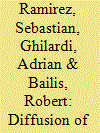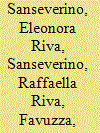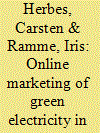|
|
|
Sort Order |
|
|
|
Items / Page
|
|
|
|
|
|
|
| Srl | Item |
| 1 |
ID:
127944


|
|
|
|
|
| Publication |
2014.
|
| Summary/Abstract |
ACM, Active Community Member, person that takes the initiative to fill out an application on behalf of a community; Seed, randomly selected ACM that allowed us to start collecting information; Ego, person that is interviewed. An Ego can also be an Alter, if it is mentioned by another Ego; Alter, people that provided (Type 1) or received (Type 2) information, as recalled by the Ego; Type 1 edge, an information flow in which an Alter provides information to an Ego; Type 2 edge, an information flow in which an Ego provides information to an Alter; Student, a person whose main occupation is to go to school; Radio, a message spread through the radio. Usually local stations in which an individual is interviewed; Internet, information about the stoves posted on Proyecto Mirador's Website; Maquila, a person that works at a factory for an international company, textile and food processing factories are usual; Agriculture, a peasant that works on agriculture, regardless of land tenancy; Health, a nurse, doctor or other health worker; Church, a priest, nun, minister or person who works as a minister of a faith; Education, a person who works as a school teacher or university professor; PM or PM associates, direct employees of Proyecto Mirador and its Implementers; Other NGO, a person that works on other non-governmental organizations. For example, Peace corps, Hivueras, Plan Honduras; Local, a local leader that has an appointment in the community but does not receive a monetary compensation. For example, members of the water board, village councils; Housewife, a woman whose main occupation is to keep the house; Business, a person that does commerce or services, includes people that sell food informally, artisans, masons, etc.; Government, a person who works directly for the government (except education and health practitioners); PM employees, direct employees without the implementers
|
|
|
|
|
|
|
|
|
|
|
|
|
|
|
|
| 2 |
ID:
128043


|
|
|
|
|
| Publication |
2014.
|
| Summary/Abstract |
Based on a recent technical-economical analysis on the island of Pantelleria, a policy feasibility study for a complete upgrading of the energy system of this Mediterranean Island is carried out. Pantelleria, situated between Sicily and Africa, owns a large potential in terms of renewable energy resources, although there are some obstacles in turning it into a Near Zero Energy system. Starting from a deep energy system audit, the study proposes the project for a near zero energy island, through the efficient transformation of the different existing natural energy resources into electrical energy and heat: the solar, the wind-based and the geothermal systems. In this way, the island can be turned into an almost autonomous system. The main difficulties connected to the implementation of the project can be identified in the national energy policies as well as in the specific local situation, characterized by a strong private monopole on generation and distribution of electrical energy which has no incentive for supporting the costs connected to the energy requalification of the island. On the other hand, the local administrations, involved in the project through bottom-up European policies, do not have the cultural and economic tools to go on with the implementation
|
|
|
|
|
|
|
|
|
|
|
|
|
|
|
|
| 3 |
ID:
127906


|
|
|
|
|
| Publication |
2014.
|
| Summary/Abstract |
There is an increasing body of research on consumer preferences concerning electricity from renewable resources. The purpose of this study is to analyze how providers' online marketing in one of the most developed markets for green energy can be improved. We conducted a content analysis of nearly 480 providers' websites, examining as many as 620 products. We found that energy providers' communication seems to be in line with academic research on potential customer benefits (utilitarian benefits, "warm glow", nature experience). However, communication could be improved by giving more detailed information on the impact of the consumer's decision, e.g. by giving numbers on CO2-emissions saved. Moreover, providers could improve the effectiveness of their visual messages by using more pictures related to renewable energy. Further, self-expressive benefits of buying green energy could be created by offering merchandise articles symbolizing the contribution a consumer makes by choosing a green tariff. When comparing purely green energy providers to other providers, we found that the former offer a wider choice as well as more products supporting new renewable installations. Important implications for policy makers aiming to phase out alternative energy subsidies emerge from our findings.
|
|
|
|
|
|
|
|
|
|
|
|
|
|
|
|
|
|
|
|
|